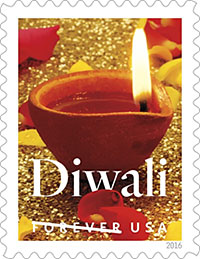Atlanta, GA, August 23: The U.S. Postal Service will commemorate the joyous Hindu festival of Diwali with a Forever stamp. The Wednesday, Oct 5, first-day-of-issue dedication ceremony will take place at the Indian Embassy in New York City.
The stamp design is a photograph featuring a traditional diya oil lamp beautifully lit, sitting on a sparkling gold background. Diya lamps are usually made from clay with cotton wicks dipped in a clarified butter known as “ghee” or in vegetable oils.
Also known as Deepavali, Diwali celebrates the triumph of good over evil. Spanning five days each autumn, it is considered by some to be the start of the new year.
On the Hindu calendar, Diwali falls on the eve of, or on, the new moon that occurs between mid-October and mid-November. In 2016, the main day of the festival will be celebrated Oct. 29 for South Indians and Oct 30 for North Indians.
Diwali is a shortened version of the Sanskrit word Deepavali, which roughly translates as “a necklace of lights.” During Diwali, the flickering oil-wick diyas sprinkle the homes of observers around the world.
Before the festival, many Hindus traditionally go shopping, clean their homes, open their doors and windows, create intricate rangoli — a vibrant floor pattern traditionally made from materials such as rice powder, colored sand and flower petals — and light diyas with hopes that Lakshmi, the goddess of wealth and prosperity, will visit. In some regions of India, people play games, just as Hindu lore says that the god Shiva did. On the festive main day of the holiday, families pray for Lakshmi, dress up in their best clothes, enjoy lavish feasts and sweets, exchange gifts and light fireworks. Diwali also marks the new year for people in Gujarat and a few other states of India.
Sally Andersen-Bruce of New Milford, CT, photographed the diya. Greg Breeding of Charlottesville, VA, designed the stamp and William J. Gicker of Washington, DC, service as the project’s art director.
The Diwali stamp is being issued as a Forever stamp. This Forever stamp will also be equal in value to the current First Class Mail 1-ounce price.
The Postal Service receives approximately 40,000 suggestions for stamp ideas annually from the public. Stamp subjects are reviewed by the Citizens’ Stamp Advisory Committee. Of that, approximately 25 topic suggestions for commemorative stamps are selected by the Committee for the Postmater General’s approval.
Visit this link for information on upcoming stamp events.
The Postal Service receives no tax dollars for operating expenses and relies on the sale of postage, products and services to fund its operations.





